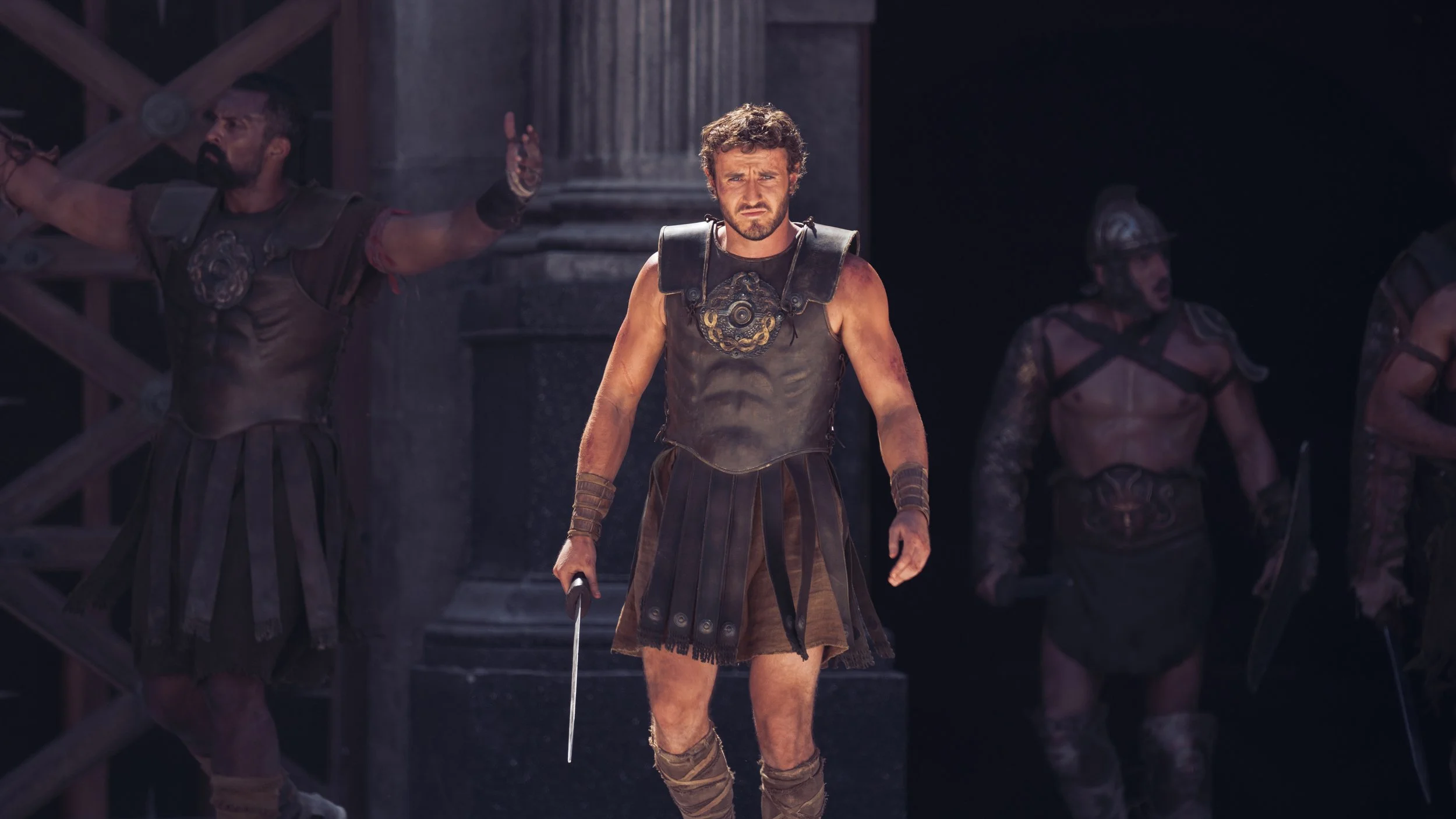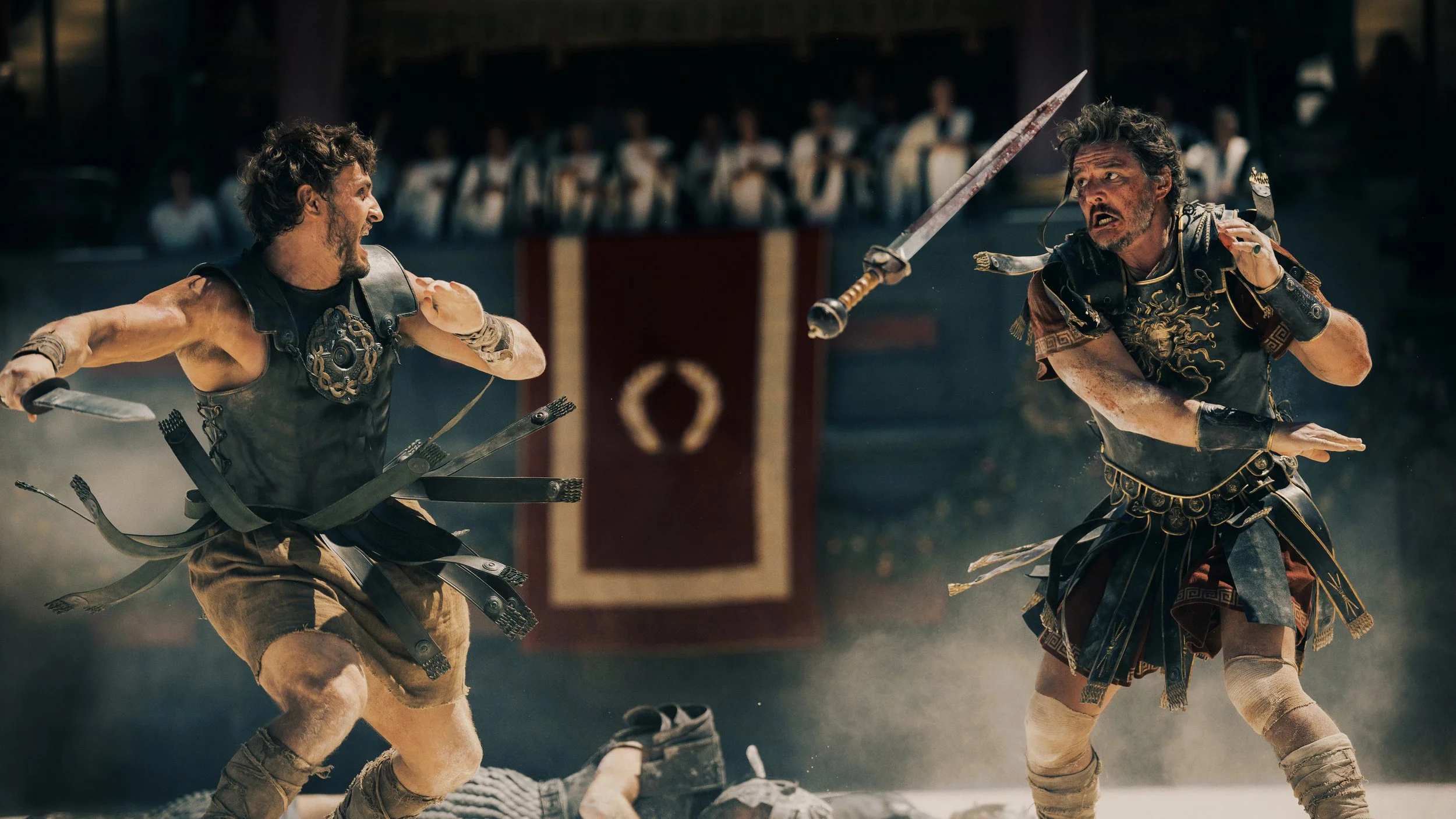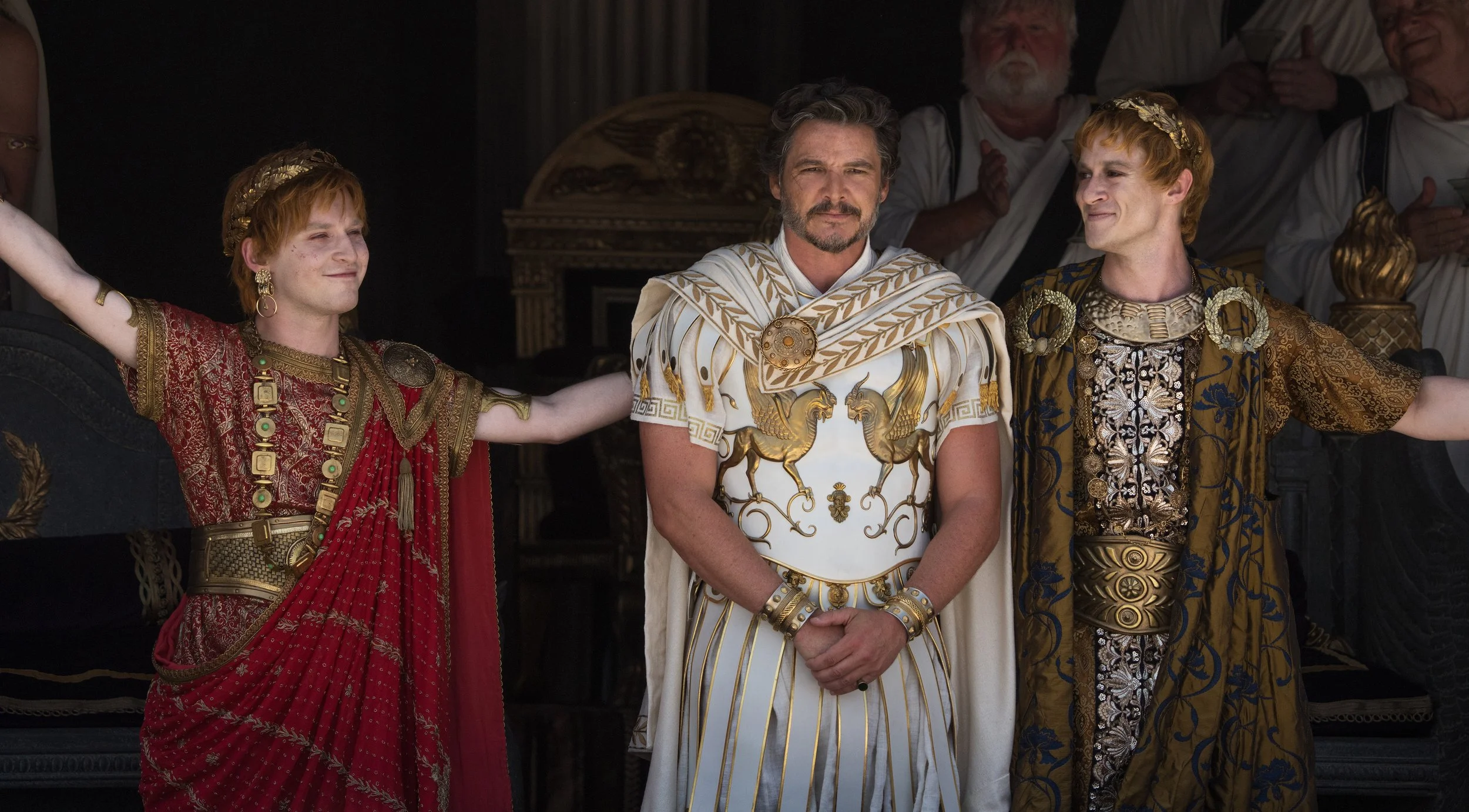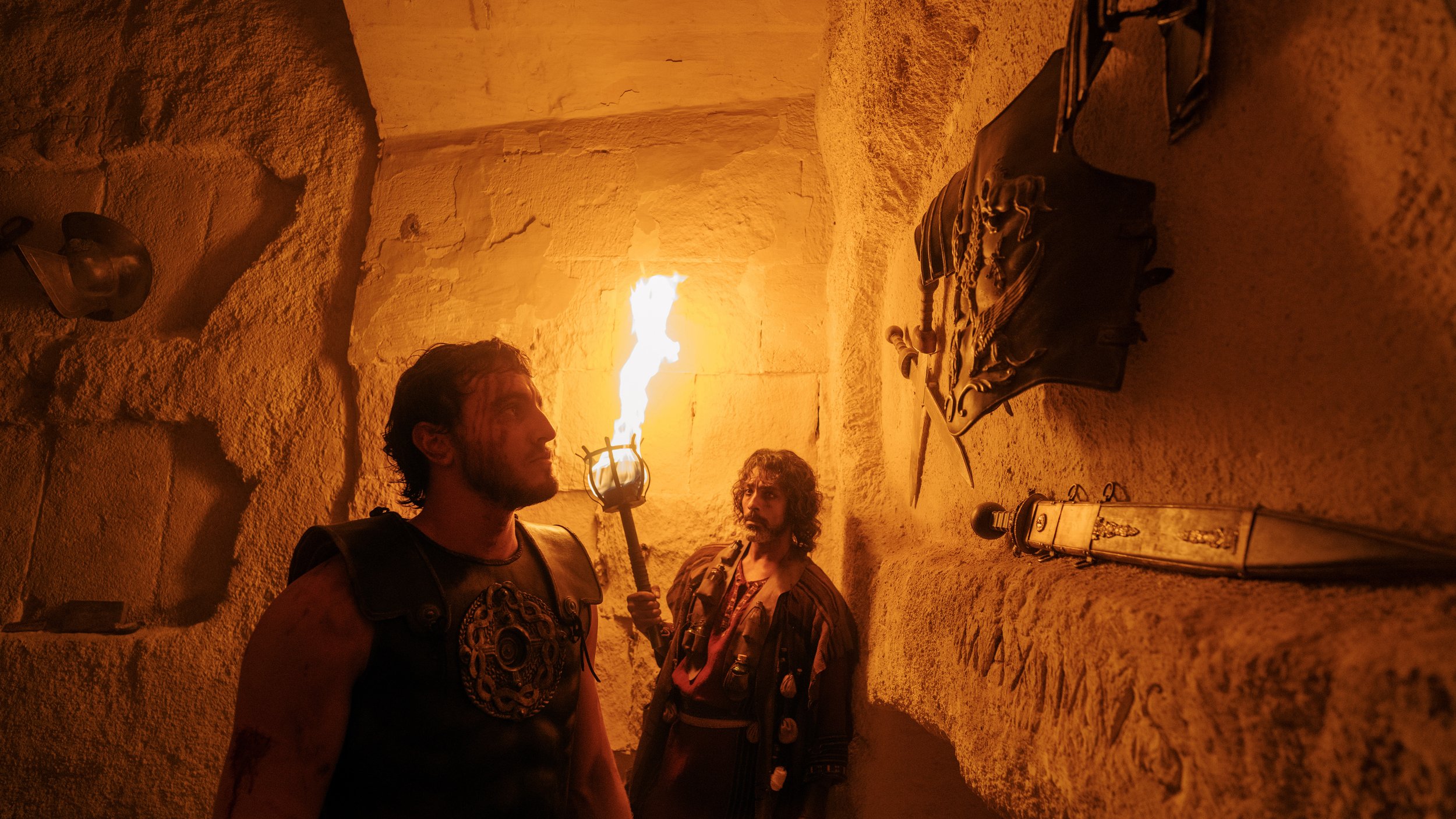‘Gladiator 2’ Review - In Paul Mescal We Trust
Twenty-four years after Ridley Scott introduced the world to Russell Crowe's Maximus in Gladiator, Scott returns to the amphitheater with even more gladiatorial bloodshed as Lucius (Paul Mescal) picks up his father’s sword and steps into the arena.
In the lead-up to Gladiator II, the marketing for the film hasn’t shied away from the fact that Mescal is playing the illegitimate son of Maximus and Lucilla (Connie Nielsen), but the film keeps that piece of information close to the chest throughout Act 1. In the opening scene, Mescal is introduced as Hanno, a humble farmer and happy husband to Arishat (Yuval Gonen), whose entire life is turned upside down when the Roman legion invades their homeland of Numidia.
Much like this father, he is pressed into slavery and sold off to entertain the masses in the gladiatorial arena. Hanno is purchased by the ever-scheming Macrinus (Denzel Washington) who sees the value in owning a gladiator that is so fueled by rage that he will stop at nothing to survive in the arena. He wants revenge for what happened to his wife, and Macrinus is quick to promise him the head of Marcus Acacius (Pedro Pascal), the general who led the campaign to conquer Numidia, if Hanno keeps fighting and winning him money in the arena.
Mescal and Pascal Are a Tale of Two Tragedies
From Hanno’s point of view, Marcus Acacius is the villain of his story, but early on, Gladiator II allows audiences to see that there is more than meets the eye with the general. He shows true discomfort as Numidian mothers wail over the violent ends their sons and daughters met, and expresses a desire to see his conquests end with Numidia, but he is not in control of his fate, or Rome’s for that matter. Rome’s future rests in the hands of madmen.
After the fall of Lucilla’s brother Emperor Commodus (Joaquin Phoenix in Gladiator), Rome eventually fell under the rule of twin emperors, Geta (Joseph Quinn) and Caracalla (Fred Hechinger), who rule with an unquenchable thirst for blood and tyranny. Whatever machinations Acacius and his wife may have for improving Rome, and restoring it to the glory it once was, is an impossible dream.
Mescal and Pascal have nary a scene outside of the conflict that Gladiator II’s opening scene locks them into, but the conclusion of their narrative arc is one of the most profound scenes of the year, and the stuff of Roman legends. Both actors are deftly skilled at drawing rich emotion from audiences, and their final scene is sure to tug at heartstrings.
Last year, Mescal found himself in two heartfelt awards contenders (Aftersun and All of Us Strangers), one of which earned him his first Academy Award nomination, but Gladiator II makes it clear that he has the mettle to become a true movie star. He carries this film on his back, with all the charm, charisma, and care that made Crowe a household name after Gladiator.
‘Gladiator II’ Is More Than Just a Legacy Sequel
Scott has struggled to regain favor with critics and audiences alike following a trio of critically panned films (The Last Duel, House of Gucci, and Napoleon), and Gladiator II seems to be following in their footsteps, unfortunately. Sequels are often viewed unfavorably, especially when such a large amount of time has passed, but Gladiator II justifies its existence, not only with its excellent script but with unforgettable performances across the board.
The key difference between Gladiator and Gladiator II is that the world is a vastly different place than it was in the wake of Y2K. Audiences settling in to watch Gladiator on May 5, 2000, lived in a world where 9/11 was unimaginable, where a decades-long war was unthinkable, and where the mere idea of democracy and the Great American Empire falling beneath the tyrannical weight of an insecure red-headed megalomaniac sounded like the stuff of fiction. You simply cannot view Gladiator II without accepting the context in which David Scarpa and Peter Craig have penned their script. It may be a legacy sequel, but it is also a satire about modern-day politics.
Nostalgia has benefited the original Gladiator well, elevating it to one of the greatest epics of this century, but even it was met with oddly dismissive criticism from the New York Times, Village Voice, Los Angeles Times, and other leading voices at the time. Despite the mixed reception, it went on to win five Academy Awards, including Best Picture and Best Actor. Mescal should follow in Crowe’s footsteps and secure his second Best Actor nomination, if the industry were just.
‘Gladiator II’ Knows How to Use Nostalgia
By design, sequels cannot avoid referring to what came before, because it informs not only the plot at hand, but the audience’s decision to leave their homes in favor of a crowded movie theater. Gladiator II benefits greatly from the fact that Lucius was old enough to remember his mother and father (even if he didn’t know Maximus was his father), and to have been present for key moments in the first film, without forcing exposition onto him. Just as it benefits from the fact that Ancient Rome loved to enshrine gladiators in glory, and venerate them after their deaths, so naturally—people would still be talking about them.
The nostalgia that Gladiator II is always in service of the plot, and rarely heavy-handed. Scott is often coy with the parallels he draws to his own film, most notably. in having Hanno fondle harvested grain much in the same way his father combed his fingers through the waving plants. The story feels like a natural continuation of the last remaining threads left loose at the end of Gladiator, and with Mescal at the lead, it feels like something new, versus retreading old ground.
Even when Lucius dons his father’s armor, it isn’t done for the sake of nostalgia. If anything, it is done to make up for the absence of Crowe, and to represent Maximus protecting his son from beyond, as the imagery the scene evokes draws heavily on the established idea of the afterlife. If one were to engage with the deeper meanings being explored throughout the film, beyond the blood and gore of the arena, Gladiator II would be hailed as a truly remarkable piece of cinema. But it seems cinema is for the incurious contrarian now, feasting on the sins it pins to what it doesn’t understand like carrion.
Shot digitally, as opposed to being shot on film as its predecessor was, where Gladiator II lacks in visual grit, it makes up for it with its stunning visuals, which include awe-inspiring battles and Mescal’s always well-lit baby blues. Gladiator II goes big, bold, and brave in every choice it makes, and it deserves to be the next big blockbuster.
GRADE: A
Gladiator II is in theaters tomorrow. Watch the trailer below:




